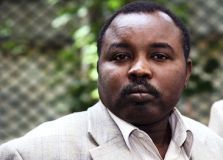Al-Nur reaffirms his refusal to negotiate with Sudan’s regime
November 20, 2014 (ADDIS ABABA) – Abdel Wahid al-Nur, the leader of a faction of the Sudan Liberation Movement (SLM-AW) refused to take part in the upcoming round of the African Union brokered talks, calling for popular uprising to bring down the regime.

Speaking to Sudan Tribune on Thursday, al-Nur said the current process would not lead to any positive change in Sudan, pointing that the ruling National Congress Party (NCP) in its recent general convention refused reforms even in its structures and leadership.
“So we couldn’t expect anything from them (the NCP) at this process,” he said, emphasising “there is no future under the regime of the National Congress Party. The popular uprising is the only solution for change in Sudan”.
Further, al-Nur called on his partners in the Sudanese Revolutionary Front (SRF) to “reject partial peace agreement because it would not achieve genuine peace. Illusioned anyone who believe that negotiations with this regime can achieve peace,” he said.
The rebel groups say they are keen, at the present stage of talks, to ensure that the framework agreements they are negotiating ensure that humanitarian assistance reaches the affected civilians and that the national dialogue process will be held under a suitable atmosphere to reach the desired goals in terms of genuine peace and democratic transition.
The SLM-AW leader also called on the opposition umbrella of the National Consensus Forces (NCF) to stick to its rejection of dialogue with the regime saying “we stand with them to achieve change. There is no future for this country and the region with this regime”.
The NCF this week reiterated its refusal to participate in the national dialogue process in response to a formal invitation received from the dialogue committee. The alliance of the left parties demands to create conducive environment for the process before to engage in it.
WAYS FOR PEACE
Asked to explain his vision for peace, the rebel leader said the civilians are not part of the conflict and the government has first to stop bombing on their villages, rape of women, or arming militias and tribes as well.
“Once the government implements these steps everywhere, in Darfur and the Two Areas, we can engage in talks on the ceasefire and the other matters because for us this is the cessation of hostilities,” he said.
The rebel leader went further to say that the release of freedoms is not negotiable as “they are natural rights” inherent to all human beings and listed in the international and regional treaties.
“People think the freedoms is a gift donated by the National Congress Party but the matter should not be like that,” he stressed.
Al-Nur stressed on the need to restitute land ownership rights to former owners, adding that the possession of land by the force does not mean the loss of rights
The SLM leader who refuses to negotiate with Khartoum since the Abuja peace process (2004-2006) however said he is peace lover and will keep seeking a genuine peace.
During his interview with Sudan Tribune he proposed his own roadmap asking to form a transitional government tasked with the security of all the Sudanese and the preparation of a new constitution to be endorsed by a referendum.
“This constitution should determine clearly the role of religion in politics, national identity, fair sharing of national wealth and power and the affirmative action for the minorities,” he added.
According to the rebel leader this transitional government will guarantee the exercise of freedoms and prepare for free and internationally monitored elections.
REGIONAL AUTONOMY
Al-Nur underscored that self-rule should not specific to one region but a natural right for all Sudanese regions within the framework of a federal government.
He pointed that the right to self-government has been mentioned in political documents of all SRF factions, stressing it has been stipulated in the founding charter of the SRF, the New Dawn charter and the SRF restructuring charter.
“Demanding autonomy is not a new (issue) and all (SRF factions) emphasise the right of regions for self-government”, he said.
The rebel leader further said it is better that Sudan be governed by a secular federal state which separate religion from politics, denying he threw personal allegations at any member of the SRF.
In statements to several media, Yasir Arman, SPLM-N secretary general and head of its negotiating team for the talks on the Two Areas said they would not renounce from the Popular Consultation process provided in the Comprehensive Peace Agreement of 2005.
Arman further explained that, once this process is held, they will advocate for a regional territorial autonomy within one Sudan stressing on the important number of Christians in South Kordofan and Blue Nile, and the fact they were part of the Closed Districts, established by the colonial power, with the South Sudan.
(ST)
